| Srl | Item |
| 1 |
ID:
144319
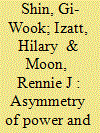

|
|
|
|
|
| Summary/Abstract |
While power asymmetry typically defines security relationships between allies, there exist other forms of asymmetry that influence alliance politics. In order to illustrate how they can shape policy outcomes that cannot be explained solely through the lens of power capabilities, the authors examine the role of relative attention that each side pays to the alliance. It is their central argument that since the client state has a greater vested interest in the alliance and given that attention depends on interest/need, the client state can leverage attention to get its way. By analysing two specific cases, the 2002 South Korean schoolgirls tragedy and the 2008 beef protests—instances where the South Koreans succeeded in compelling US concessions—the authors show that because the alliance was more central to the client state's agendas, there existed an asymmetry of attention that offered leveraging opportunities for the weaker ally. In this study, the authors emphasise the role of media attention as a key variable, and seek to contribute to debates on weaker party leverage in asymmetrical alliances.
|
|
|
|
|
|
|
|
|
|
|
|
|
|
|
|
| 2 |
ID:
115614
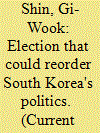

|
|
|
| 3 |
ID:
101628
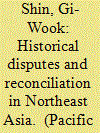

|
|
|
|
|
| Publication |
2010.
|
| Summary/Abstract |
Unhealed wounds from past wrongs, committed during colonialism and war, have created regional animosity and stunted reconciliation in Northeast Asia. Claiming that continued disputes over historical injustice are not solely an intra-Asian issue, this article explores how the US can facilitate historical reconciliation in the region. It is necessary to recognize that the US played a significant role in dealing with historical issues in the aftermath of World War II. Aside from failing to fully address Japanese war crimes in the Tokyo Tribunal, the US was also pivotal in setting the terms of the San Francisco Peace Treaty, a legal instrument that has been the historical precedent for expunging any sense of Japanese guilt and responsibility. Likewise, the US has yet to formally accept its own actions which could be perceived as "crimes against humanity": the US atomic and carpet-bombing of Japanese cities. This article advocates a self-critical, self-reflective approach that would involve US acknowledgement of its own responsibility in handling or mishandling of history issues in Northeast Asia. More specifically, the article also evaluates recent proposals for a presidential visit to Hiroshima or Nagasaki as a means of recognizing the human suffering caused by the atomic bombing, and for a new interpretation of the San Francisco Peace Treaty to better enable victims of Japanese war crimes to air grievances. This article supports both proposals but also argues that they must be implemented with caution and within a larger regional historical framework rather than as an attempt to bolster solely US-Japanese relations.
|
|
|
|
|
|
|
|
|
|
|
|
|
|
|
|
| 4 |
ID:
117831


|
|
|
| 5 |
ID:
167842


|
|
|
|
|
| Summary/Abstract |
Korea’s migrants have diversified in recent decades. This special section gathers articles that address this development by examining issues of class as an analytical lens in addition to ethnicity and citizenship, and also by considering the contributions of migrants from both human and social capital perspectives. By doing so, we aim to provide a better understanding of the varied experiences, realities, and complexities of Korea’s increasingly diverse migrant groups.
|
|
|
|
|
|
|
|
|
|
|
|
|
|
|
|
| 6 |
ID:
160385
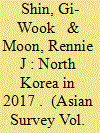

|
|
|
|
|
| Summary/Abstract |
Kim Jong Un continued to consolidate his power through personnel changes, and North Korean society saw increasing consumerism, along with signs of growing inequality. The economy did well through early 2017 but the subsequent effects of sanctions remained uncertain. North Korea conducted its first test of an intercontinental ballistic missile and its sixth nuclear test, triggering heated debate in the US and elsewhere about how to respond. Kim clearly is not going to give up working on weapons of mass destruction.
|
|
|
|
|
|
|
|
|
|
|
|
|
|
|
|
| 7 |
ID:
059912


|
|
|
| 8 |
ID:
167846


|
|
|
|
|
| Summary/Abstract |
South Korea faces a shortage of highly skilled labor, but with a low tolerance for diversity, it lags behind in its global competitiveness to retain mobile skilled talent. Using data on foreign students and professionals, we demonstrate the potential of skilled migrants as both human and social capital for Korea and suggest that the country is poised to adopt a study-bridge-work framework to compensate for its competitive weaknesses.
|
|
|
|
|
|
|
|
|
|
|
|
|
|
|
|
| 9 |
ID:
152248
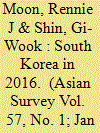

|
|
|
|
|
| Summary/Abstract |
President Park faced a leadership crisis after revelations that she relied on a confidant with no official position for key decision-making in state affairs. Heavy industry met with serious financial difficulties, and a strong anti-corruption law was enacted. North Korea tested more nuclear weapons and missiles. Controversy over the deployment of Terminal High Altitude Area Defense strained South Korea’s relations with China.
|
|
|
|
|
|
|
|
|
|
|
|
|
|
|
|